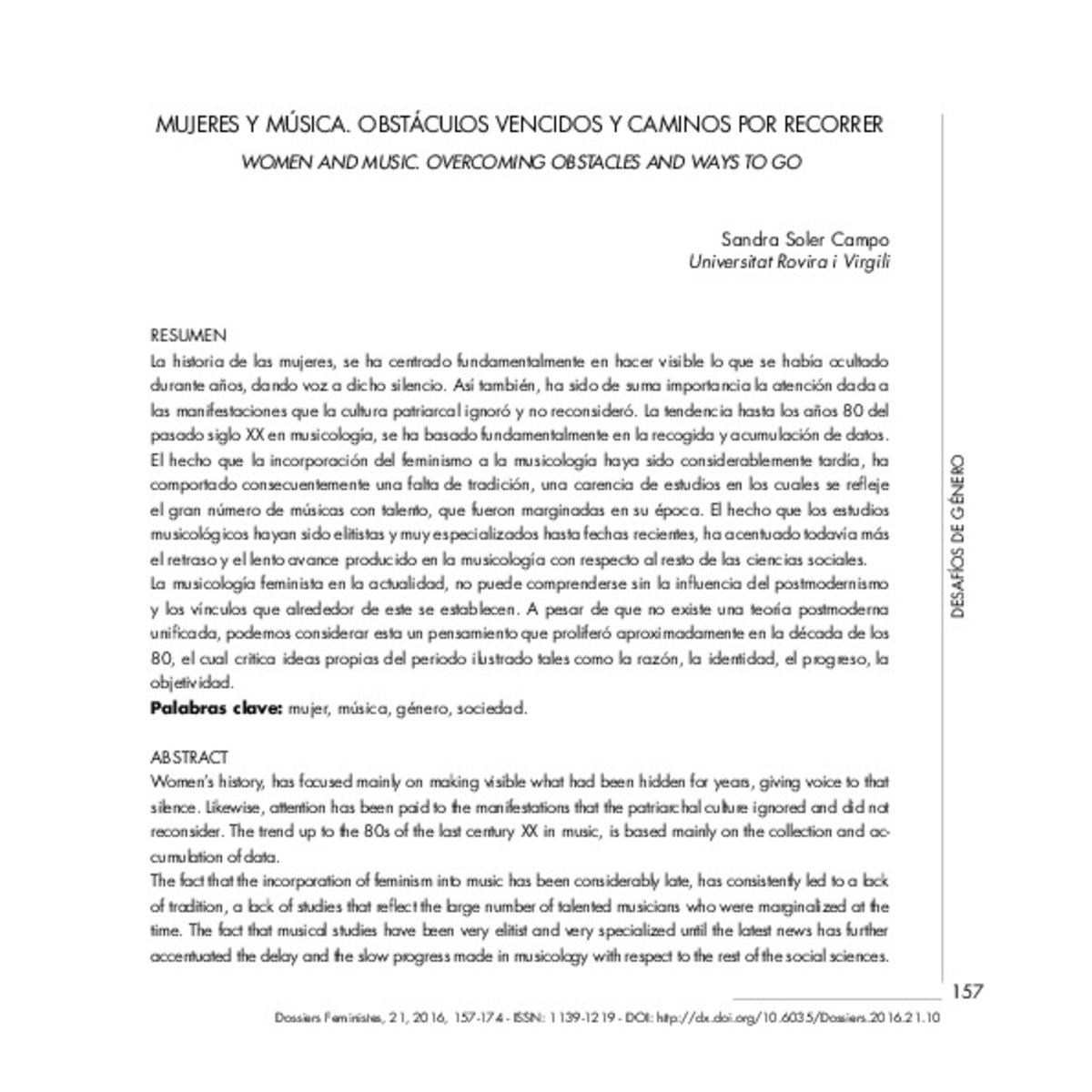Mostrar el registro sencillo del ítem
Mujeres y música. Obstáculos vencidos y caminos por recorrer
| dc.contributor.author | SOLER CAMPO, SANDRA | |
| dc.date.accessioned | 2017-09-06T11:50:25Z | |
| dc.date.available | 2017-09-06T11:50:25Z | |
| dc.date.issued | 2016 | |
| dc.identifier.citation | SOLER CAMPO, Sandra. Mujeres y música. Obstáculos vencidos y caminos por recorrer. Dossiers feministes, 2016, no 21, p. 157-174. | ca_CA |
| dc.identifier.issn | 1139-1219 | |
| dc.identifier.issn | 2340-4930 | |
| dc.identifier.uri | http://hdl.handle.net/10234/168587 | |
| dc.description.abstract | La historia de las mujeres, se ha centrado fundamentalmente en hacer visible lo que se había ocultado durante años, dando voz a dicho silencio. Así también, ha sido de suma importancia la atención dada a las manifestaciones que la cultura patriarcal ignoró y no reconsideró. La tendencia hasta los años 80 del pasado siglo XX en musicología, se ha basado fundamentalmente en la recogida y acumulación de datos. El hecho que la incorporación del feminismo a la musicología haya sido considerablemente tardía, ha comportado consecuentemente una falta de tradición, una carencia de estudios en los cuales se refleje el gran número de músicas con talento, que fueron marginadas en su época. El hecho que los estudios musicológicos hayan sido elitistas y muy especializados hasta fechas recientes, ha acentuado todavía más el retraso y el lento avance producido en la musicología con respecto al resto de las ciencias sociales. La musicología feminista en la actualidad, no puede comprenderse sin la influencia del postmodernismo y los vínculos que alrededor de este se establecen. A pesar de que no existe una teoría postmoderna unificada, podemos considerar esta un pensamiento que proliferó aproximadamente en la década de los 80, el cual critica ideas propias del periodo ilustrado tales como la razón, la identidad, el progreso, la objetividad. | ca_CA |
| dc.description.abstract | Women’s history, has focused mainly on making visible what had been hidden for years, giving voice to that silence. Likewise, attention has been paid to the manifestations that the patriarchal culture ignored and did not reconsider. The trend up to the 80s of the last century XX in music, is based mainly on the collection and accumulation of data. The fact that the incorporation of feminism into music has been considerably late, has consistently led to a lack of tradition, a lack of studies that reflect the large number of talented musicians who were marginalized at the time. The fact that musical studies have been very elitist and very specialized until the latest news has further accentuated the delay and the slow progress made in musicology with respect to the rest of the social sciences. Feminine musicology today cannot be understood without the influence of postmodernism and the ties that surround it. Although there is no unified postmodern theory, we can consider this a thought that proliferated in the 1980s, which criticizes the ideas of the period illustrated as reason, identity, progress, objectivity. | ca_CA |
| dc.format.extent | 18 p. | ca_CA |
| dc.format.mimetype | application/pdf | ca_CA |
| dc.language.iso | spa | ca_CA |
| dc.publisher | Universitat Jaume I. Institut Universitari d'Estudis Feministes i de Gènere | ca_CA |
| dc.relation.isPartOf | Dossiers feministes, 2016, no. 21 | ca_CA |
| dc.rights.uri | http://rightsstatements.org/vocab/CNE/1.0/ | * |
| dc.subject | mujer | ca_CA |
| dc.subject | música | ca_CA |
| dc.subject | género | ca_CA |
| dc.subject | sociedad | ca_CA |
| dc.subject | woman | ca_CA |
| dc.subject | music | ca_CA |
| dc.subject | gender | ca_CA |
| dc.subject | society | ca_CA |
| dc.title | Mujeres y música. Obstáculos vencidos y caminos por recorrer | ca_CA |
| dc.title.alternative | Women and Music. Overcoming Obstacles and Ways to go | ca_CA |
| dc.type | info:eu-repo/semantics/article | ca_CA |
| dc.identifier.doi | http://dx.doi.org/10.6035/Dossiers.2016.21.10 | |
| dc.rights.accessRights | info:eu-repo/semantics/openAccess | ca_CA |
| dc.relation.publisherVersion | http://www.e-revistes.uji.es/index.php/dossiers/article/view/2484/2073 | ca_CA |







